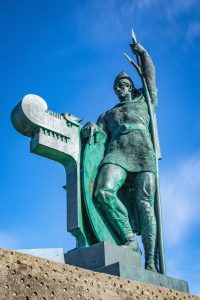 On March 26, 2025, the GlacierShares Nasdaq Iceland ETF was launched. The ETF tracks the MarketVector Iceland World Index. The Index tracks each Icelandic corporations (54.5% of the index) and firms in different Nordic nations which have a considerable footprint in Iceland (13% Luxembourg, 11% Norway, 7% Switzerland … adopted by the US and the Faroe Islands, about equally weighted). Iceland’s financial system is closely depending on only a handful of industries: power manufacturing, tourism, fishing, and smelting aluminum. (Smelt and smelting?)
On March 26, 2025, the GlacierShares Nasdaq Iceland ETF was launched. The ETF tracks the MarketVector Iceland World Index. The Index tracks each Icelandic corporations (54.5% of the index) and firms in different Nordic nations which have a considerable footprint in Iceland (13% Luxembourg, 11% Norway, 7% Switzerland … adopted by the US and the Faroe Islands, about equally weighted). Iceland’s financial system is closely depending on only a handful of industries: power manufacturing, tourism, fishing, and smelting aluminum. (Smelt and smelting?)
The market cap of Iceland’s two inventory exchanges, the principle alternate and the small/midcap alternate, involves about €22 billion. That’s in regards to the dimension of Darden Eating places. There are 28 corporations in the principle market and 5 within the rising market.
The expense ratio is 0.95%.
The Case for Iceland in your portfolio
(I can hardly consider I simply typed that)
Knowledge on the MarketVector index is scarce. The equal MSCI Iceland IMI index reveals a fairly modest case for Iceland. Listed here are the five-year stats for MSCI’s Iceland index towards a broad index of European shares and MSCI’s ACWI – developed + growing market – index.
| APR | Customary deviation | Sharpe ratio | Max drawdown | |
| MSCI Iceland | 7.9 | 21.2 | 0.34 | 39% |
| EURO STOXX | 9.0 | 19.5 | 0.3 | n/a |
| MSCI ACWI | 12.4 | 17.3 | 0.62 | 34.5 |
The Icelandic market suffered catastrophic losses through the World Monetary Disaster, together with a drawdown of practically 75%, with a systemic banking collapse described as “the most important of any nation in financial historical past.” Scandals, felony prosecutions, and reforms adopted.
Unquestionably, Iceland was not an amazing funding up to now. That’s not shocking: smaller rising markets international locations are likely to get whipsawed in durations of world volatility, and the years because the GFC absolutely qualify. The argument for the fund is that the far north – Iceland, the Arctic, the Nordic states – could have a disproportionately larger position within the human future. There appear to be two units of arguments:
- Iceland is a extremely useful nation. The advisors spotlight the truth that Iceland is #1 on the Inexperienced Future Index (measuring clear power, innovation and insurance policies), #3 on the UN’s Human Growth Index, #1 on the World Financial Discussion board’s gender-equality rankings, #3 on the World Inhabitants Assessment’s Happiness Index, and #1 globally when it comes to private security; it additionally derives 100% of its power from renewable sources. Their public debt is low and falling.
- Iceland’s corporations are positioned to thrive in an unstable, warming world. They’ve developed deep experience in renewable power sources corresponding to geothermal and hydropower. They’re a worldwide chief in creating sustainable fisheries, and there’s a strong demand for his or her merchandise. Plentiful clear power and a talented workforce make them a horny locale for knowledge facilities and different tech investments.
Collectively, these shares are probably undervalued attributable to low analyst protection, providing worth alternatives. As well as, the ETF provides broader publicity to Nordic shares. We’ve famous the argument for Nordic shares in our Launch Alert for CrossingBridge Nordic Excessive Earnings Bond. Over the previous decade, Constancy Nordic has returned 8.6% yearly, 300 bps larger than Morningstar’s world fairness index, which additionally speaks to the area’s potential.
What in regards to the volcanoes?
Boy howdy, there are a bunch of them for good and in poor health. These are a form of combined blessing. Elevated exercise threatens infrastructure, can disrupt agriculture and fisheries, and spooks potential traders (a foul factor in small, liquidity-sensitive markets). Some vacationers are drawn by them, others repelled.
On the similar time, elevated exercise with out catastrophic eruptions would possibly enhance the geothermal power potential of the island, enhance Iceland’s attractiveness as a carbon-capture hub, and draw vacationers. At its base, Iceland builds volcanism into the equation: its infrastructure and social planning begin with the omnipresent actuality and construct from there.
Backside line
Iceland gives publicity to renewable power, sustainable industries, and post-COVID tourism restoration, interesting to ESG-focused and area of interest traders. Nevertheless, small market dimension, liquidity constraints, and sector focus require cautious danger administration. Traders ought to prioritize long-term horizons and diversification.



